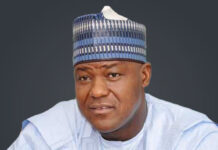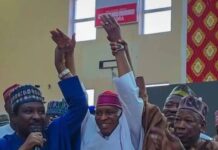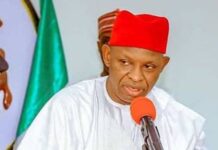Coalition Movement: Tinubu will be voted out in 2027 – Adamu Maina Waziri
In an interview with Weekend Trust, former Minister of Police Affairs and founding member of the PDP, Alhaji Adamu Maina Waziri, speaks on why he joined the alliance under the African Democratic Congress (ADC), the risks of continued political fragmentation, and how the coalition intends to confront the Tinubu administration in 2027.
He also addresses concerns about the ambitions of major political figures in the coalition, defends the legitimacy of challenging the incumbent, and insists that performance—not ethnicity or religion—must shape Nigeria’s political future.
Many were surprised to see you at the unveiling of the ADC. What convinced you to join the coalition, and how far do you think it will go?
READ ALSO: ADC-led coalition leaders can’t stop Tinubu – Wike
Waziri: After the 2023 elections, any reasonable politician should have seen the outcome as a wake-up call. It taught us that there’s a need to broaden the base of opposition parties and expand their constituencies to avoid repeating the same mistakes.
What do I mean? The final result showed that if you combined the votes of the second and third-placed candidates, they would have defeated the first. Yet, we ended up without a clear winner, politically speaking. Secondly, after every election cycle, the so-called winner begins to poach members of the opposition—luring them with appointments or, in some cases, using state institutions to blackmail, harass, or even eliminate them.
That’s how the PDP fell into the hands of a leadership that, for all practical purposes, is ill-suited to position the party as a strong contender for 2027. Because of that, many of us—painfully, I must say—accepted the challenge of bringing PDP and other opposition parties under one umbrella. But unfortunately, the leadership of those parties distanced themselves from us. The Labour Party did, the PDP did, and so did the SDP.
READ ALSO: Security operatives take over PDP headquarters
So we had to go ahead as individuals. After much trial, we finally found a credible platform to challenge what I consider the worst government Nigeria has ever had.
All signs show that this government will do anything—grab, run, manipulate—to maintain its stranglehold on the country. For those of us who came from the PDP tradition, let’s not forget: the PDP was formed in 1997–99 to challenge military rule and restore democracy. So it’s not unusual for us to return to the trenches in defence of participatory democracy and good governance—two things this incumbent government is clearly not providing.
Some argue that many faces in the ADC are familiar—former governors, senators, ministers, even a past vice president. Critics say these are the same people who contributed to Nigeria’s problems. What’s new here, aside from grievances against Tinubu, possibly for not appointing you?
Waziri: But is it not legitimate to have grievances against Bola Tinubu? And if you’re saying we’re recycled politicians, the same applies to those in the APC. Some of them were in the PDP when we were in power. Some defected to APC later. Should we just surrender and retreat because we’re not fresh faces? Nigeria belongs to all of us.
There’s a wise saying: not trying at all is failure. We are challenging this government based on its performance—or lack of it. It’s every Nigerian’s right to do so, regardless of age or past political experience. They’ve moved on from the debate about Atiku’s age because there’s evidence that Tinubu is older than Atiku. Now the new talking point is “recycled politicians” and “grievances”? Let me be clear: I have no personal grievance with Tinubu. He didn’t appoint me; he won’t appoint me; and I wouldn’t accept any appointment from him. But I do have grievances with the way he has impoverished me and rendered this country insecure. I have grievances with his government’s failure, and I want him removed by legitimate means, through the same democratic process by which he came to power.
It’s our most basic right as citizens, to either confirm a government or remove it. We have chosen to remove this one. People should not be lazy in defending failure. If you have grievances with how this country is being run, join hands to challenge it in the next election cycle.
You mentioned that the second and third-placed candidates in the last election are now with the ADC. You see it as an asset, but others see it as a liability. How do you reconcile their ambitions to ensure unity in the run-up to 2027?
Waziri: But why are you the one to determine who should be president and who should be vice president?
We that God has blessed to birth this coalition will also be given the wisdom, courage, and strategy to produce credible candidates—for the presidency, for governorships, and for the National Assembly. Right now, we’re building. Meanwhile, look at the current government: the vice president and the president are not on the best of terms, and it’s already affecting governance. Why is no one asking about that?
READ ALSO: ‘From giant of Africa to diplomatic ghost’: Atiku mocks Tinubu over Trump snub
I’m from Yobe, which borders Borno. I can tell you firsthand that the relationship between the president and the vice president is sour.
I served under Obasanjo and Atiku, under Umaru Yar’adua and Jonathan, and under Jonathan and Namadi Sambo. I know what it looks like when a president and vice president are not getting along—and the current relationship is not ideal.
And we all know the saying: when two elephants fight, it’s the grass that suffers.
Ahead of 2015, there were many with ambition, but people rallied around Buhari. This time, the ADC appears crowded—Atiku, Obi, Tambuwal, Amaechi, yourself. Isn’t this ambition overload a problem for the coalition’s stability?
Waziri: Nigeria is a country of over 200 million people—very diverse, very complex. Among us, there are highly educated and highly uneducated people.
READ ALSO: How Tinubu blasted ex-president Jonathan’s state of emergency declaration on 3 states in 2013
If a party has nine or ten presidential aspirants, what’s the problem with that? Eventually, primaries will produce one candidate. Then we’ll move to general elections. Is it a bad thing to have multiple competent aspirants in the ADC?
Compare us with parties narrowing down prematurely to a single option. That was the mistake the PDP made in 2015 when it said Jonathan had the right of first refusal and printed only one nomination form. What happened? We lost. When Buhari emerged in the APC, it wasn’t by consensus. He contested against others—and that’s democracy.
Still, many believe Jonathan allowed a level playing field. Do you think there will be fair competition this time?
Waziri: I must correct you there. I was in government at the time. Nobody expected Jonathan to contest in 2015. He had pledged to us that he would do only one term. That broken promise—not the Buhari factor—was what made his defeat easier.
No Nigerian president has ever emerged as a sole candidate of their party without consequence. It’s always a mistake. It’s a failure of gentlemanly honour.
Some believe that you and others in this coalition are simply trying to return power to the North—which may ultimately cause this political ship to collapse. What’s your response?
Waziri: I am not part of any arrangement that says power must reside in one region—north or south—for four or eight years. I reject that mundane thinking. At this point in Nigeria’s history, when everything is collapsing, we must look for the best among us, regardless of where they come from. We must identify the best Nigerian, present them, and market them based on merit—not religion or region. On party basis, I don’t believe my peers from the South would claim the current administration represents the best of the South. I have many friends among the Yorubas, and they themselves ask: “Is this the best the Yoruba can offer?” So why reduce everything to Muslim versus Christian or North versus South?
Let’s return to democratic principles. In a democracy, leadership should emerge through a credible process—not by quota or sentiment.
READ ALSO: Coalition success and the future of democracy in Nigeria, by Engr. Bello Gwarzo Abdullahi, FNSE
You are still a BOT member of the PDP (as of Thursday when this interview was conducted), and given your longstanding relationship with the party’s acting national chairman, many expected you to do more to resolve the party’s internal crisis.
Waziri: Yes, I remain a member of the PDP Board of Trustees. But he [Damagum] has defied all of us.
Have you reached out to him personally?
Waziri: He is supposed to reach out to me. I’m senior to him. But even at that, I’ve done what I could. I never expected he would descend to this level, but he has.
For him, it’s not about service to the party or to Nigerians. We’ve made several efforts to put the party back on track, but they say it’s better to be alone than in the company of fools.
Isn’t the ADC already facing internal combustion of its own—possibly moving from frying pan to fire?
Waziri: There is no combustion. That’s misinformation.
READ ALSO: Labour Party issues Peter Obi 48-hour deadline to exit
But the party’s 2023 presidential candidate, Dumebi Kachikwu, has publicly accused you and others of hijacking the party from its founders. The ADC was founded in 2005—don’t you think he has a point?
Waziri: After an election, there is no such thing as “candidate”. Atiku was the PDP presidential candidate, yet he’s now leaving the party. Does that give him any extra say in PDP?
Dumebi is just a rabble-rouser—he’s not standing on any credible ground. We’ve been working on this coalition for 17 months. It didn’t start yesterday. We learned from the mistakes in PDP, APC, and even NNPP. We evaluated lessons from all sides before concluding that the ADC was the best available platform without encumbrances.
Was that because you lost confidence in INEC registering a new political party?
Waziri: Yes—look at how the country is being run. There’s a high risk INEC won’t approve new parties. That’s one.
Secondly, as of today, there are 108 or 109 pending applications for new parties. The last one submitted was ADA. So what are the chances? Can INEC justify registering ADA without considering the 107 before it? Some of these applications have been pending for five years. What will be the compelling reason to skip the queue? Unless we start questioning these processes, Nigeria won’t get it right.
READ ALSO: Coalition: Atiku, Obi, Amaechi, Mark, others meet to adopt ADC
Some coalition members—especially those who wanted to register a new party—feel misled. They say you knew it wasn’t going to be possible and still led them down that path, causing friction.
Waziri: Like who?
Dr Umar Ardo, for instance.
Waziri: When did Dr Ardo even join the coalition? Ask him. He’s another rabble-rouser. Nobody authorised him to speak on behalf of the coalition.
He was busy with his group, the League of Northern Democrats. He even said, publicly, that they’ve now renamed it the Nigerian League of Democrats and are submitting an application to INEC for registration. That’s already in the public domain.
So why migrate from something you founded to something others have spent 17 months building? That’s not how serious politicians behave.
Back in November 2024, we decided to pursue two parallel options: either find an existing platform without legal baggage or continue trying to register a new one. Whichever came first, we would go with it. That was our coconsensus.
READ ALSO: ‘From giant of Africa to diplomatic ghost’: Atiku mocks Tinubu over Trump snub
Peter Obi has proposed a one-term presidency if given the chance. Atiku hasn’t made such a promise. Do you think Atiku would step aside for Obi, or is this just political posturing?
Waziri: These are men of high repute who want to lead Nigeria. Let’s give them the benefit of the doubt.
One says he will do a single term, another stays silent—what’s wrong with that? Did Tinubu ever tell you he was going to do two terms before he was elected? Was that part of any campaign promise? No.
For those of you coming from the PDP, aren’t you sceptical of the “one-term” promise, given what happened with Jonathan and the fallout that followed?
Waziri: No—let me clarify that. Jonathan didn’t promise one term. He entered into an agreement to serve just one term.
He completed the late Yar’adua’s term, which lasted two years. When he wanted to run in 2011, many in the North said: “You’ve completed Yar’adua’s tenure; let the presidency return to the North.”But some of us in government said no—we are pushing our luck too far. Jonathan was already president, had committed no constitutional offence, and was doing fairly well.
So we asked him to commit to doing only one full term. He agreed. That’s how we supported his candidacy—and that’s why he won.
READ ALSO: Thousands of APC serving, ex-councillors to endorse Tinubu for 2027 election
But two years into his administration, he started plotting to run again, even when the constitution says you can only be sworn in twice. That’s what created the internal revolt. The party didn’t allow any other candidate to contest the primaries—only one form was printed and handed to Jonathan.
Meanwhile, Buhari was gaining momentum, and northern expectations had been built on the idea that power would return after four years. That betrayal made us vulnerable. And it cost the PDP dearly.
What, then, should guide your coalition in choosing a flagbearer in 2027?
Waziri: It must be about the country—not the man. Governance, not personal ambition.
I come from the North East. This administration allocated N1 trillion for road infrastructure across Nigeria. Do you know how much the North East got? N29 billion. Just N29 billion. Are we not Nigerians too.
READ ALSO: Military imposes drone operation ban in North East
If people from the North East say they will not vote for another term of this administration, are they committing heresy? These are the kinds of questions we must ask—and the sort of injustice we must resist.
We cannot run a country based on the whims and caprices of a few. There must be moderation. There must be a sense of fairness and equity.
Government performance should foster national cohesion—not erode it. When cohesion breaks down, the entire country is weakened. Voting for or against Bola Tinubu is part of the democratic process. The constitution guarantees that freedom.
So yes, not voting for Tinubu is legitimate. And we will exercise that legitimacy. He is going to be voted out in 2027.
You’re from the North East and have long been one of the PDP’s key figures in the region. Even in the last election, PDP won your state. But now, in 2027, the region has a sitting vice president. How do you convince the average Northeasterner to let go of a number two already in hand and back a candidate whose fate is uncertain?
READ ALSO: Police arrest 2 for multi-state cement diversion, fraud
Waziri: We have a number two under this current dispensation. But I told you earlier—N1 trillion was allocated for road infrastructure, and the North East got just N29 billion. That should answer your question.
Finally, how far do you think the ADC will go?
Waziri: I was in the PDP when people said we would rule for 60 years. God cut that short at 16.
If, by the will of the Almighty, the ADC wins the 2027 election and delivers on its promise, I will be satisfied. By 2031, Nigerians will hopefully be voting based on performance—not ethnicity, religion, or sentiments.
We’re not saying Bola Tinubu should be voted out because he’s Yoruba or from the South. No. We’re saying he should be voted out based on performance.
He was quoted—and shown on video—saying that if he didn’t provide electricity in four years, Nigerians shouldn’t vote for him. So let’s revisit that video. Absolutely.
We are challenged. And we are ready.
Follow the Neptune Prime channel on WhatsApp:
Do you have breaking news, interview request, opinion, suggestion, or want your event covered? Email us at neptuneprime2233@gmail.com





